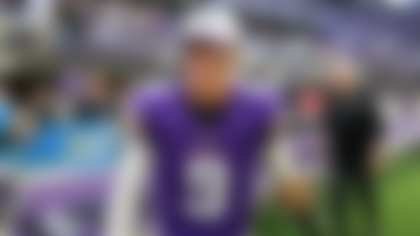Dwayne Haskins may not go down as one of the worst draft busts in NFL history, but that is largely a matter of only ranking. With his release Monday -- a week after photos surfaced of a mask-less Haskins at a large birthday party, in violation of the league's COVID-19 protocols, and less than 24 hours after he was benched during an abysmal performance Sunday -- Haskins completed a remarkably rapid collapse from local boy made good to profound disappointment and became an indictment of the culture that existed in the Washington Football Team when he was drafted 15th overall just 20 months ago.
Haskins' release was not much of a surprise, only the timing. He was fined $40,000 and stripped of his captaincy after the party photos emerged -- his second violation of the COVID-19 protocol -- but the Washington Football Team had few other viable options for a starting quarterback last week, with the NFC East championship on the line and Alex Smith injured. Still, Haskins struggled mightily in Sunday's 20-13 loss to the Carolina Panthers, turning the ball over three times before getting benched in favor of Taylor Heinicke, who hadn't thrown an NFL pass in two years but performed much better than Haskins when given the chance.
The arc, then, became a familiar one in the NFL. The headaches Haskins was creating off the field were no longer worth putting up with when he wasn't helping on the field. Patience runs out often in the NFL. Rarely, though, does it expire this quickly for a quarterback, especially a first-rounder. Haskins appeared in just seven games this season, with seven interceptions in his last five starts. Washington lost each of those five games, finishing with a 3-10 record over two years with Haskins as the team's starter.
Haskins had been demoted twice to third string within this season, and coach Ron Rivera -- charged with changing and cleansing the culture in a long-toxic organization -- had no ties to Haskins. Haskins was drafted by the previous regime, over the reported objections of the football decision-makers, in part, reports indicated, because Haskins was a favorite of owner Dan Snyder. Haskins went to high school in Maryland with Snyder's son. When Snyder raced down to the locker room in the middle of a game after Haskins got hurt last season, the image of the young quarterback as teacher's pet was set, particularly because neither Rivera nor his predecessor, Jay Gruden, ever sounded enthusiastic about Haskins' play.
Haskins sounded a note of contrition following his release: "I take full responsibility for not meeting the standards of a NFL QB & will become a better man and player because of this experience," the quarterback tweeted.
Haskins was certainly responsible for much of his demise. At 6-foot-4 and 230 pounds, the former Ohio State quarterback was considered a potential top-10 prospect who had finished third in the 2018 Heisman Trophy vote before declaring for the NFL draft. He was so highly regarded that a segment of fans and media excoriated the New York Giants for selecting Daniel Jones over Haskins. But Haskins' preparation habits were questioned almost immediately in his rookie season, and his breeching of the COVID-19 protocols designed to keep him and his teammates safe and available to play this season suggested that his maturity and leadership skills are badly lacking. That is especially damning for a quarterback, particularly because Washington is surprisingly in position to win the division. His carelessness risked getting himself -- the starting quarterback -- and teammates sick. It was inexcusable and it was impossible to imagine how his career in Washington could survive it. That is all on Haskins.
Still, the Washington organization itself shares in the big-picture blame for Haskins' downfall. Haskins was thrust into circumstances that would have made it difficult for anybody to succeed, and he was operating in a particularly bright spotlight because he was drafted by his hometown team. Washington has embraced and spit out players before -- check in on Robert Griffin III -- and it was hard to miss the whiff of resentment from the coaching staff to Haskins last year and Rivera's reluctance to cast his lot with Haskins this season. Haskins didn't create the difficult culture in Washington, where alliances among decision-makers were created and undone with a frequency that required a flow chart, but he is just the latest example of how the Byzantine politics of the place could undermine individuals and torpedo the football product.
At just 23 years old, the machinations in Washington had to be hard to process for a player who was used to success and stardom. Haskins looked and sounded miserable after Sunday's game. As frustrating as his play and behavior has been, it was impossible not to feel badly about how defeated he appeared to be.
"Definitely the hardest week of my life," Haskins said Sunday night. "I just want to bounce back and move forward and pray and get my life together."
If he does -- frankly, even if he doesn't -- Haskins is certain to get an opportunity, and probably more than one, to resurrect his career elsewhere. He is young and physically gifted and a fresh start might be exactly what Haskins needs, away from the perception that the owner had foisted him on his coaches, and in a place where he can quietly work on his game and grow up.
Washington is, remarkably, still in position to go to the playoffs. That is a credit to both Rivera and Smith, whose own soaring comeback story has been the counterweight to Haskins' decline.
If Washington makes it to the postseason, it will help provide cover for what, the Football Team has to hope, is the final roster fiasco engineered by Snyder's regimes. The dysfunction ran deep for years, and Rivera still has plenty of clean-up work to do, as does Snyder, who has been confronted by a series of allegations of widespread mistreatment of women in his organization.
There is a broader conversation to be had about why the culture of the NFL and its fans promotes more discussion of Haskins' missteps than Snyder's. But it says plenty about a franchise that the shockingly swift failure and exile of one first-round pick can evoke sympathy from another who suffered the same fate:
Follow Judy Battista on Twitter.












